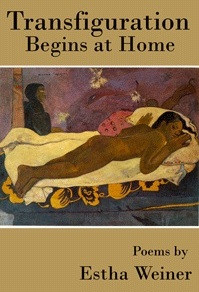nycBigCityLit.com the rivers of it, abridged


Reviews
Transfiguration Begins at Home
by Estha Weiner

Transfiguration Begins at Home
by Estha Weiner
Tiger Bark Press, 2009; 67 pages; $15.95
ISBN 978-0-9816752-2-0, paper
www.tigerbarkpress.com
Reviewed by Susana H. Case
The changes undergone in Estha Weiner's Transfiguration Begins at Home may not glorify or exalt in the conventional sense of transfiguration, but, rather, are transmutations of the self and vital others whom the poet examines as pieces of archaeology from her past, the pieces that didn't always turn out the way they might have if there were a well turned-out overseeing hand arranging the perfect life. But being well turned-out doesn't last, and perfection is unattainable, and it's still okay, as in this excerpt from the title poem that begins by describing the Cinderella Staircase of a home, as viewed by a child (presumably the author, although it's written in the third person):
The one who climbed it from the bottom was
always different at the top Cinderella
could turn into a princess A prince could
turn into a frog Before a father could
descend it with a daughter on his arm
to give her away in marriage a daughter
would ascend it with a father on her arm
to give him away to silence Anything
is possible
That anything IS possible, creates a tone not of exaltation followed by tragedy, but of acceptance and wry humor, the cutting up of experience with a particularly sharp knife and making even the least appetizing pieces good for the stew. It is fresh, intriguing, and inviting. There is evidence here, also of someone very much amused by words and connections, and ably amusing the reader as well, as in "Red."
Don't wear it
said the mother—It
makes you look
Italian.
Wear it
said the Irish lover—It
looks terrific
on you.
Won't have it
in the house
said the friend—It
reminds me
of my husband
who loved
Lipstick Silk
Maraschino Geranium
Tomato Lobster
Fire Radish
Toenail Polish Blood.
Weiner's poems, never overly wordy, stretch the concept of punctuation to see where it leads the reader and, as in "Red," use enjambment in sometimes startling ways. It is not only these devices, but mastery of syntax and, in particular, the long-sentence poem that are on display in this variant collection.
Divided into four untitled sections, with an introductory poem, "Roots," the poems are rooted in childhood and early family life, but in adult experience as well and not with clear-cut divisions, as early experiences so clearly inform the woman who results from them. The first section includes the title poem preceded by a poem about the writer's relationship with her father, "tragedies," that begins: "Nothing if not/complex, this Electra." The father is a more clarified presence in these poems and in the second section the mother is a more elusive figure. In the third section, the reader grasps more roundly the adult created from these beginnings, as she follows her father's counsel delineated in "tragedies", once again: "I know/you love me,/but you really must/find someone else." With the someone else she finds in "The Bar That Never Closes," "The talk has always been the sex/The sex has always been the talk." But, relationships are complicated, and not only for Weiner, as she portrays so well in "Scatology Series":
Marek calls the erotic
sculptures he invites me to see
at the gallery where I run
into the man
who'd once been my life
who'd introduced me to Marek;
Scatology Series, to which I bring
another man, whom I met through
another man, who has twice been my lover,
and friend to both men I've already mentioned,
but not to Marek, whose wife is here
and helped with the opening of Scatology Series,
although they're living apart;
and I gaze at the objects
Marek has sculpted, sensuous urinals
in purest white porcelain, mounted
on steel, and I learn
that the man who'd once been my life
will be married in autumn,
(although this didn't happen),
and I leave with the man
whom I brought to the gallery
who will soon have to leave
to dine with the son of the woman
who has left him for the third time.
The last section of the collection, includes, but is not limited to, writing more about the mother, a figure both glamorous and harshly ill at the end of her life in Weiner's memories and sometimes in the same poem. But the father is here in his vividness too; he's here after the depredations of aging and disease (in this case Parkinson's as in "When They Were Kings"). Also, he's here before, in another time, prefiguring the transformations that create the woman from the child in their home. "In the photo": "It's 1948./There is no war./They're at El Morocco." At the end, though in the real world time is relentless, in poetry (and in photography), time is mutable, and the writer has brought the reader in a circle to the beginning, the roots of all the rest.
Susana H. Case, professor at the New York Institute of Technology, has recent work in many journals, including Hawai'I Pacific Review, Portland Review and Potomac Review. She is the author of The Scottish Café (Slapering Hol Press), Hiking The Desert In High Heels (RightHandPointing), Anthropologist In Ohio (Main Street Rag Publishing Company) and The Cost Of Heat (Pecan Grove Press). An English-Polish reprint of The Scottish Café, Kawiarnia Szkocka, was published by Opole University Press in Poland.